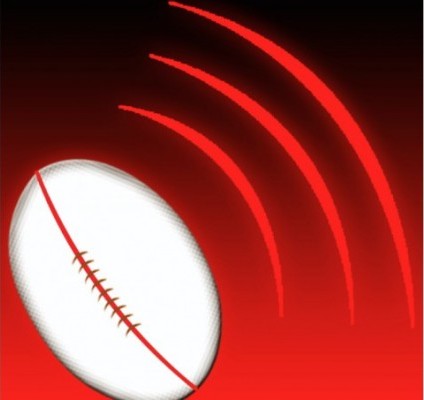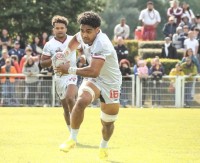Coach Pinkelman Reflects on France Trip for USA Falcons Men
Coach Pinkelman Reflects on France Trip for USA Falcons Men
It’s fair to say that the USA Falcons men’s team exceeded expectations at the EAAST 7s tournaments in France over the past two weeks.
Playing against almost-international teams and professional touring sides, the mostly collegiate group, brought together just a few days before the first tournament, were up against it.
But they showed steady improvement, going 5th in the 1st tournament and taking 2nd in the follow-up.
Head Coach Ben Pinkelman said the key was how quickly the team learned and applied those lessons.
“It was clear quite a few did not have a ton of 7s experience but they were able to adopt the game quicker than what I have experienced the last couple of years,” Pinkelman told GRR. He credited some of the players who have had some USA 7s team experience, such as Uluamu Niutupuivaha, Jake Broselle, Porter Goodrum, and Peter Sio Jr., for helping the newer players along.
But, he added, there’s “also a higher overall rugby IQ among the players are coming through now that are receiving better coaching at younger ages.”
Some of the things the players had to learn quickly was to keep scanning on defense.
“It’s very rare that a player comes into 7s and is not ruck-watching,” explained Pinkelman. “The constant scanning that needs to happen around that area to follow offload runners and get aligned on your man is far too slow. Playing NZ really highlighted this issue for us.”
University of San Diego player Paul Habeeb, who has played quite a bit of 7s, did well in this area and Pinkelman said “that’s a testament to Charlie Purdon's coaching.”
The other aspect they had to learn was to hustle on defense and make sure that defenders aren’t turning to the sideline to get outside more quickly—this leaves them open to a cutback of some kind.
“Almost every try scored against us the first week, which was a lot, was off of a switch or the first or second short-line runner off of a switch,” said Pinkelman.
The value of the second tournament was evident when these issues were exposed.
“I was impressed at how well the boys fixed these issues in Week Two,” said the coach.
There were other areas of improvement. The players aligned too deep on attack early-on and learned to be flatter and flying onto the ball. This, of course, requires the passes to be accurate.
And then there was simply keeping the flow of the game going.
“In the first week we played ruck-to-ruck,” said Pinkelman. “Looking at other teams and knowing that the two leading teams in offloads going into the Paris Olympics were the gold and silver medalists, we emphasized the importance of continuity and how, in order to grow as a team, we had to be willing to take more risks.”
Combined with better communication and a high work rate, the players started to make those connections, especially in the second week.
Next up? Get better at defending very wide attacks, and develop the recognition of space against a good, organized, and sophisticated defense like the New Zealand Cavaliers. Get better at the lineouts—many college-age 7s players are backs or loose forwards who don’t jump in the lineouts much … or at all.
Making the Jump
With his experience in PR7s and his physical skills—rangy body with a long reach and good footworks—Tucker Trickey has positioned himself to challenge at the next level. He was a 95% tackler, and scored multiple tries while setting up others.
“The New Zealand Cavaliers had three players that had played on the circuit this season; one of which was their center, who Tucker matched up with over three games,” said Pinkelman. “He got beat once.”
Aaron Faison showed some strong defensive ability and power in contact, welcome for a fast player.
Other players are very close to that international level, added Pinkelman, but need to work on one or two areas of their game.
Overall, then, it was a success—players showed what they were good at, and learned what where they need to improve. They all showed the desire and ability to take lessons and apply them on the pitch. Now the trick is to keep at it with them to see how far they can go. The RugbyTown 7s will be the next test, in August, and the Falcons program will work with Major League Rugby and scout the national club 7s to put together a roster for that event.












